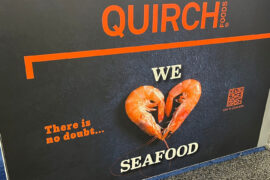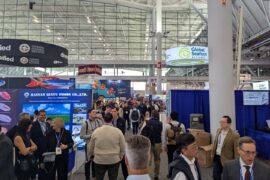Aquaculture is the fastest growing food production sector in the world and can be a crucial tool to feed the growing world population, delegates were told at the opening of the World Aquaculture Adelaide 2014 (WAA14) conference in Australia, which runs through June 11.
“With global population expected to grow from 7 billion to 9.3 billion by 2050, and the affluent middle class expected to grow by 3 billion by 2030, food production will need to double to meet surging demands,” said keynote speaker José Villalón, corporate director at Nutreco in The Netherlands. The company’s Skretting unit is a leading supplier of aquaculture feeds.
“It is estimated that more food will be required to be produced in the next 36 years than has been produced in the preceding 8,000 years,” he continued. “So we must double food production while simultaneously reducing by half the environmental/social impacts in any food production system.”
According to Villalón, fish convert a greater proportion of the food they eat into body mass than livestock, and therefore the environmental demands per unit biomass or protein produced are lower. The production of 1 kg of finfish protein requires 13.5 kg of grain, compared to 61.1 kg of grain for beef protein and 38 kg for pork protein.
“Although farmed fish may convert food more efficiently than livestock we are still dependent on the global management of common natural resources, the small pelagic fisheries for fish meal and oil, as a component of feed,” said the Nutreco executive.
“This is the most obvious dependence on natural resource sustainability for the success of aquaculture,” he continued. “However, like other food systems, water quality, climactic stability, soil vitality and other environmental resources must be managed better by humans to meet our future needs in a way that allows the true renewability of the Earth’s resources to be used responsibly.”
The private sector has a central role to play in sustainable aquaculture development, stressed the corporate director, “and it is in the best interest of industry and its ‘bottom-line’ to do so.”
Villalón said a recent example of this was demonstrated by the announcement in 2013 of the formation of the Global Salmon Initiative (GSI). Fifteen international salmon farming companies – representing 70% of global production – have come together to work pre-competitively on farm biosecurity and sea lice infestation, sustainable feeds and compliance towards Aquaculture Stewardship Council standards by 2020.
Around 2,000 delegates from around the world are attending WAA14. The government of South Australia, through Primary Industries and Regions (PIRSA), is the host sponsor, with other major sponsors being the Fisheries Research and Development Corporation (FRDC) and the Australian Seafood Cooperative Research Centre (CRC).





